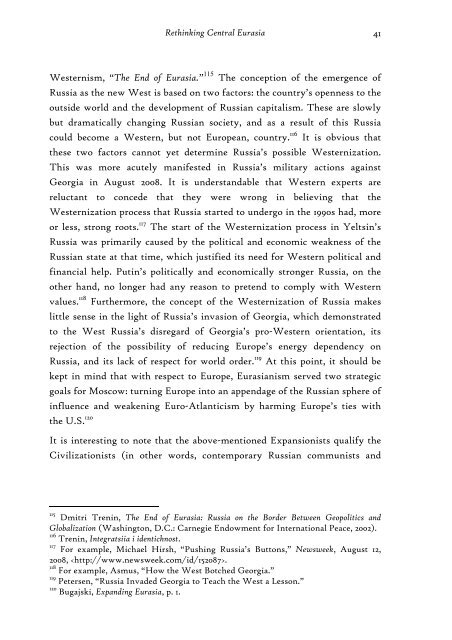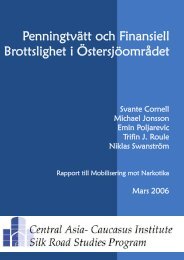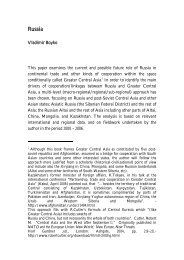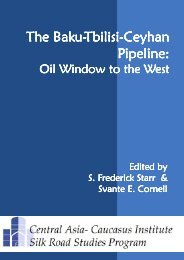Eurasianism and the Concept of Central Caucaso-Asia
Eurasianism and the Concept of Central Caucaso-Asia
Eurasianism and the Concept of Central Caucaso-Asia
Create successful ePaper yourself
Turn your PDF publications into a flip-book with our unique Google optimized e-Paper software.
Rethinking <strong>Central</strong> Eurasia 41<br />
Westernism, “The End <strong>of</strong> Eurasia.” 115 The conception <strong>of</strong> <strong>the</strong> emergence <strong>of</strong><br />
Russia as <strong>the</strong> new West is based on two factors: <strong>the</strong> country’s openness to <strong>the</strong><br />
outside world <strong>and</strong> <strong>the</strong> development <strong>of</strong> Russian capitalism. These are slowly<br />
but dramatically changing Russian society, <strong>and</strong> as a result <strong>of</strong> this Russia<br />
could become a Western, but not European, country. 116 It is obvious that<br />
<strong>the</strong>se two factors cannot yet determine Russia’s possible Westernization.<br />
This was more acutely manifested in Russia’s military actions against<br />
Georgia in August 2008. It is underst<strong>and</strong>able that Western experts are<br />
reluctant to concede that <strong>the</strong>y were wrong in believing that <strong>the</strong><br />
Westernization process that Russia started to undergo in <strong>the</strong> 1990s had, more<br />
or less, strong roots. 117 The start <strong>of</strong> <strong>the</strong> Westernization process in Yeltsin’s<br />
Russia was primarily caused by <strong>the</strong> political <strong>and</strong> economic weakness <strong>of</strong> <strong>the</strong><br />
Russian state at that time, which justified its need for Western political <strong>and</strong><br />
financial help. Putin’s politically <strong>and</strong> economically stronger Russia, on <strong>the</strong><br />
o<strong>the</strong>r h<strong>and</strong>, no longer had any reason to pretend to comply with Western<br />
values. 118 Fur<strong>the</strong>rmore, <strong>the</strong> concept <strong>of</strong> <strong>the</strong> Westernization <strong>of</strong> Russia makes<br />
little sense in <strong>the</strong> light <strong>of</strong> Russia’s invasion <strong>of</strong> Georgia, which demonstrated<br />
to <strong>the</strong> West Russia’s disregard <strong>of</strong> Georgia’s pro-Western orientation, its<br />
rejection <strong>of</strong> <strong>the</strong> possibility <strong>of</strong> reducing Europe’s energy dependency on<br />
Russia, <strong>and</strong> its lack <strong>of</strong> respect for world order. 119 At this point, it should be<br />
kept in mind that with respect to Europe, <strong>Eurasianism</strong> served two strategic<br />
goals for Moscow: turning Europe into an appendage <strong>of</strong> <strong>the</strong> Russian sphere <strong>of</strong><br />
influence <strong>and</strong> weakening Euro-Atlanticism by harming Europe’s ties with<br />
<strong>the</strong> U.S. 120<br />
It is interesting to note that <strong>the</strong> above-mentioned Expansionists qualify <strong>the</strong><br />
Civilizationists (in o<strong>the</strong>r words, contemporary Russian communists <strong>and</strong><br />
115 Dmitri Trenin, The End <strong>of</strong> Eurasia: Russia on <strong>the</strong> Border Between Geopolitics <strong>and</strong><br />
Globalization (Washington, D.C.: Carnegie Endowment for International Peace, 2002).<br />
116 Trenin, Integratsiia i identichnost.<br />
117 For example, Michael Hirsh, “Pushing Russia’s Buttons,” Newsweek, August 12,<br />
2008, .<br />
118 For example, Asmus, “How <strong>the</strong> West Botched Georgia.”<br />
119 Petersen, “Russia Invaded Georgia to Teach <strong>the</strong> West a Lesson.”<br />
120 Bugajski, Exp<strong>and</strong>ing Eurasia, p. 1.






